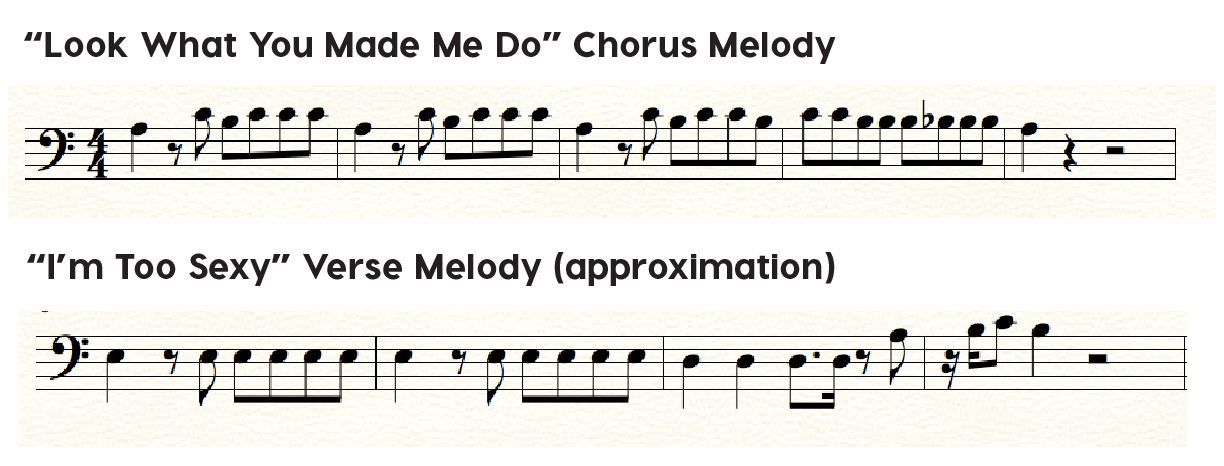In this article Ian Temple deconstructs and analyzes the musical similarities between T-Swift’s latest single “Look What You Made Me Do” and Right Said Fred’s hit 1992 classic “I’m Too Sexy For My Shirt”
_________________________
Guest post by Ian Temple of Soundfly’s Flypaper
Here’s a music-theory analysis of Taylor Swift’s “Look What You Made Me Do” and Right Said Fred’s “I’m Too Sexy.” For more analyses of pop, rock, and hip-hop songs, and to learn how to use harmonic theory in your production, check out our popular Theory for Producers course series.
Last night, Taylor Swift released a new single, and it’s already blowing up. That in and of itself is about as unsurprising as the sun rising each day. But the thing that issurprising is its writing credit…
Swift’s new track shares a writing credit with the early ’90s Brit band Right Said Fred, authors of the dementedly positive vanity piece “I’m Too Sexy.”
The thing that unites the two tracks is the rhythm of the main melody — a little skittering of notes that’s more remarkable for its spoken feel than any melodic arc. But the actual sound of each song couldn’t be more different, because… well, music is about so much more than just one element, and each artist made starkly different choices about how to treat their version of the riff.

Notice how the rhythms are the exact same at the start of the two melodies.
“I’m Too Sexy” was the perfect ’90s hit: weirdly self-assured, carefree, not giving a s@&% what anyone else thinks, just chill. It’s what you listen to while jumping out of an airplane, flicking off the pilot as you leap, frosted tips waving in your face as you free fall.
“Look What You Made Me Do,” on the other hand, is an anthem of victimization for today’s era of online trolling. It’s dark, serious, and high-stakes. It takes the sexiness of Right Said Fred’s rhythm and makes it dangerous, even venomous. This is an Arya Stark theme song with her revenge list compounding on itself ’til your initial excitement at her ability to get revenge turns into deep unease at who she’s becoming.
How does it all work?
Let’s take a quick look at Right Said Fred. First off, the instrumentation.
It’s got jangly piano, a wandering bass line (with the occasional slap), flowery horns, and even a couple big distorted guitar chords that are basically the Platonic ideal of guitar chords. Almost every instrument follows the vocal melody at some point, most notably the fairground organ during the chorus — like a gaggle of Cinderella birds singing and dancing around the lead singer’s head as he does his “little turn” and “shakes [his] little tush” on the catwalk.

It’s even got a tambourine sample in there. It’s almost impossible to hear a tambourine without picturing that overly enthusiastic band member on the corner of the stage furiously shaking his hips and wringing every drop he can from his instrument. He’ll play that tambourine all day if he has to.
Everything about this song contributes to its fun, happy-go-lucky vibe. Most importantly, compared to Swift’s version, there are instruments, traditional rock ones, and a whole lot of them.
Okay, so what about Swift’s song, then?
Well, “Look What You Made Me Do” is stark, to say the least. It’s mostly drums and synth bass with a little melodrama in the pre-chorus brought by the John Carpenter-esque piano line and in the bridge with the equally horror-inspired digital strings.
She even sped it up a little bit. “I’m Too Sexy” is a rote 120 BPM, while Swift increases the urgency to 126 BPM or so. Obviously, 120 BPM was too laid back for a revenge fantasy.
Let’s look at those similar riffs again. Melodically, Swift adds a little chromatic innovation at the end by walking down through a G♭ on her way back to the F. Some have said that chromaticism is the musical equivalent of the color brown, and I think that seems relevant here. There’s no room for color in this dark void — not even any harmonic color.

Rhythmically, it’s cold and machine-like. Trying to transcribe it was easy because of how perfectly it hits the beat, like quantized MIDI notes.
In “I’m Too Sexy,” the vocal line has a much looser rhythm and melody. I’m still not sure about our transcription for the end of his line because he just kind of warbles a little bit. Who cares about scales and notes when you’re so sexy?
It also does have some light harmonic movement during the verse (wandering from E down to D and then Bm), which is outlined by the overly excitable bass line. Look at it move!

For Right Said Fred, the rhythmic vocal line that ties the two songs together was always intended to be part of the verse. It’s a setup, not the entire dish in and of itself. It eventually gives way to an even happier, more melodic chorus, which itself gives way to triumphant horns. The whole thing is a celebration.
For Taylor Swift, the rhythmic vocal line is the entire point of the song. She gives it prime billing, as if there’s nothing else that matters. She’s angry and cold, and she’s not going anywhere.